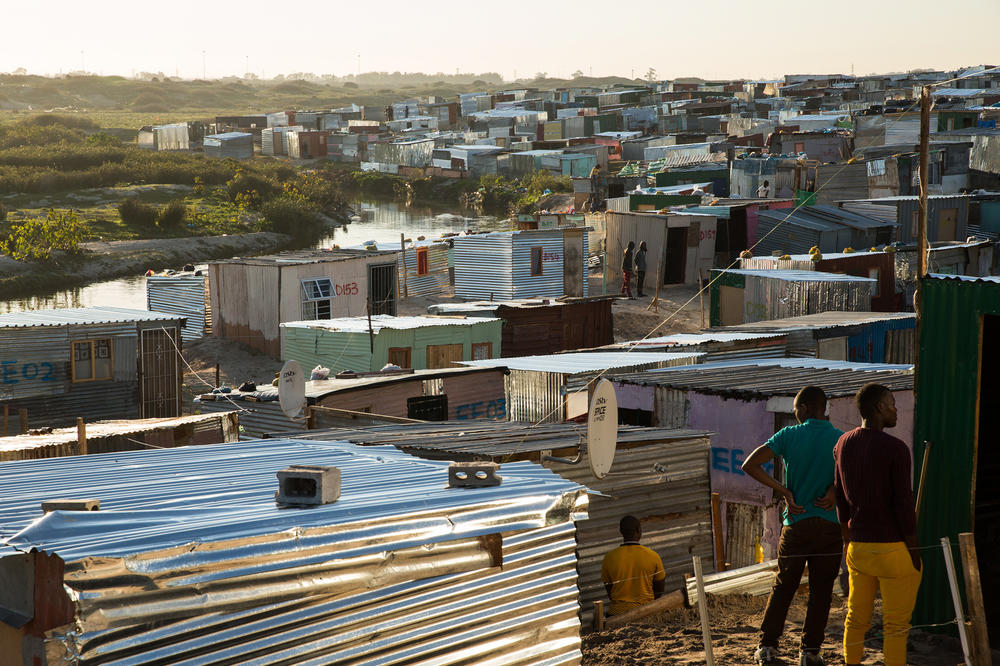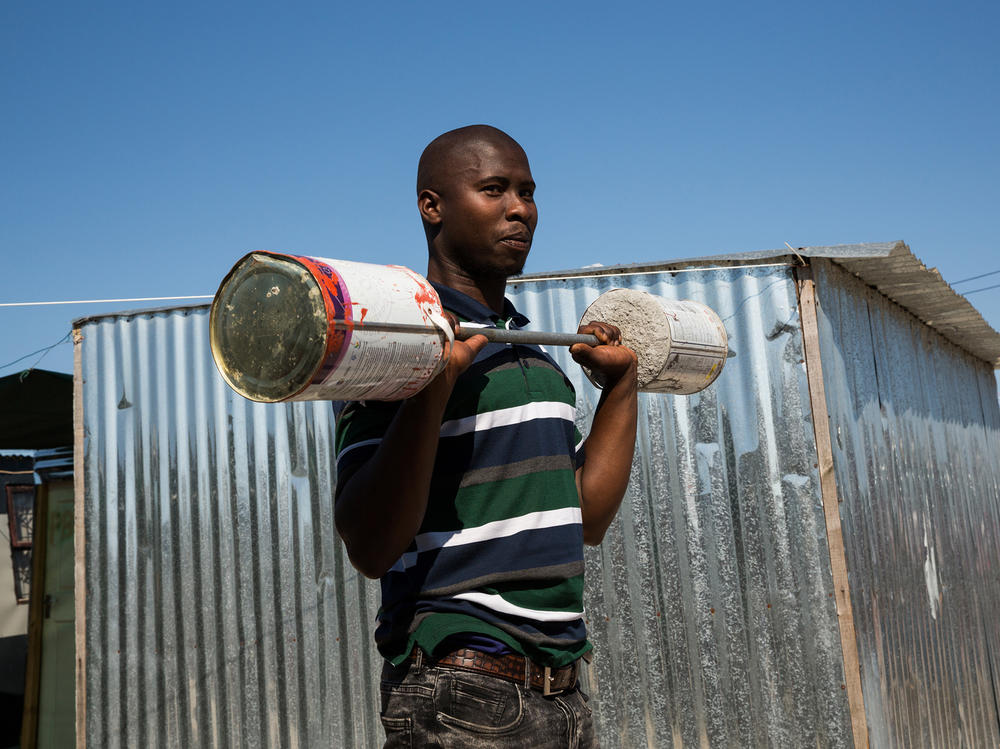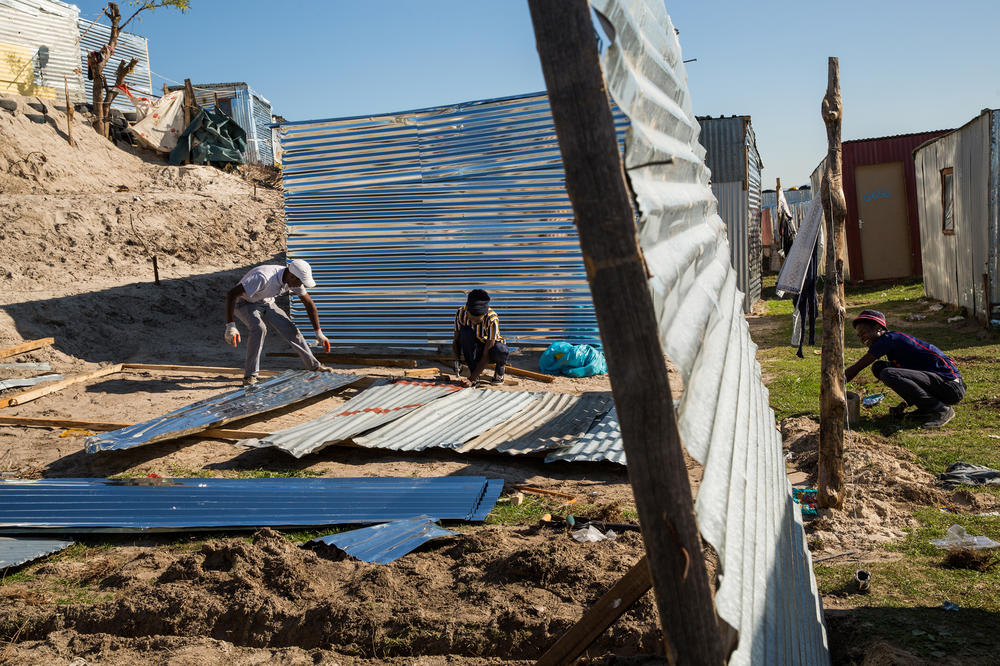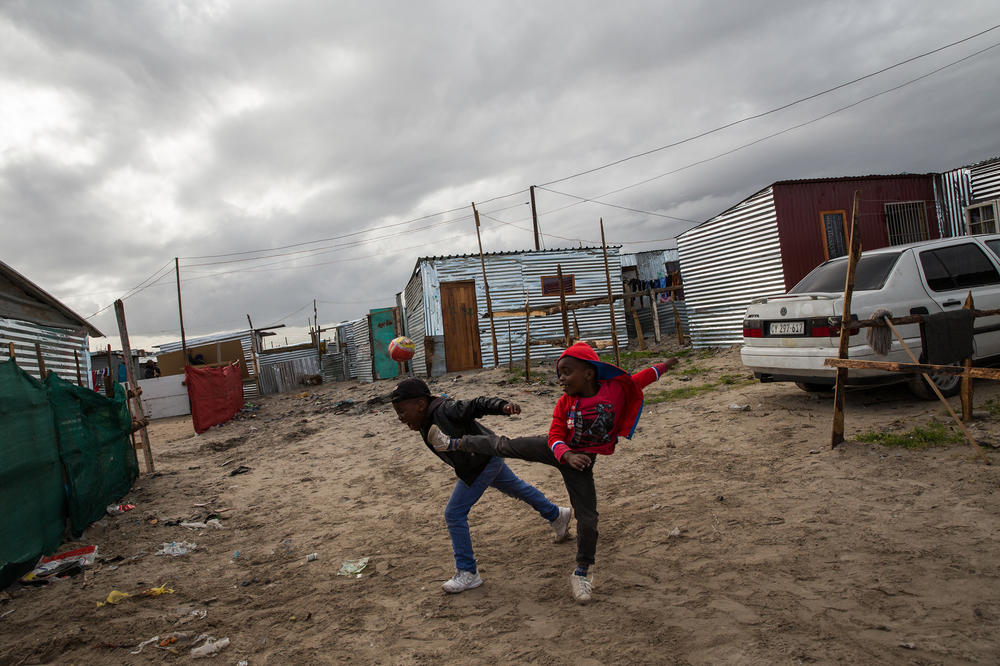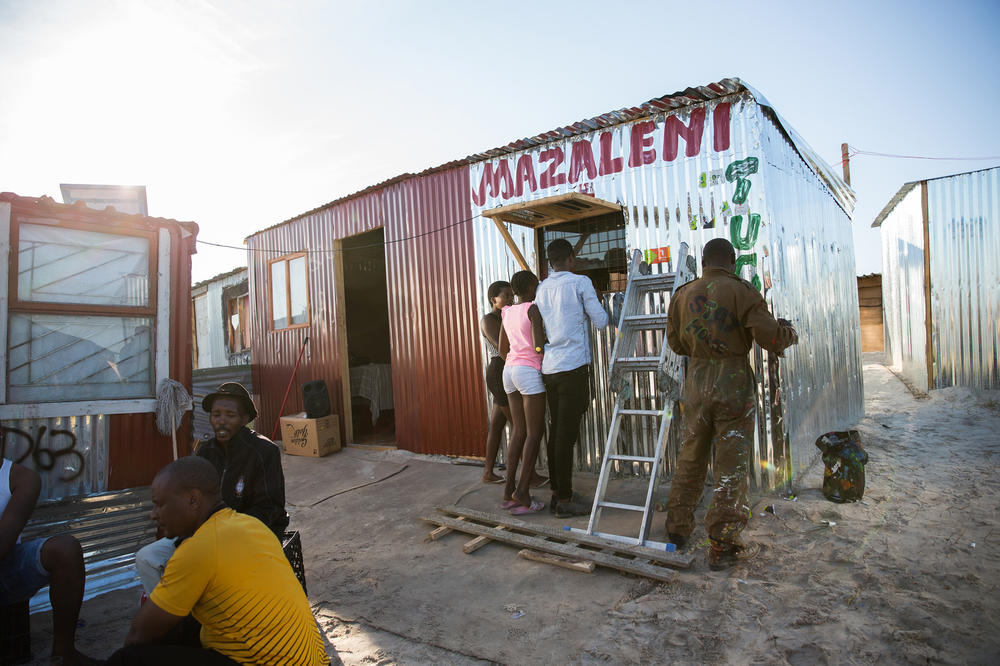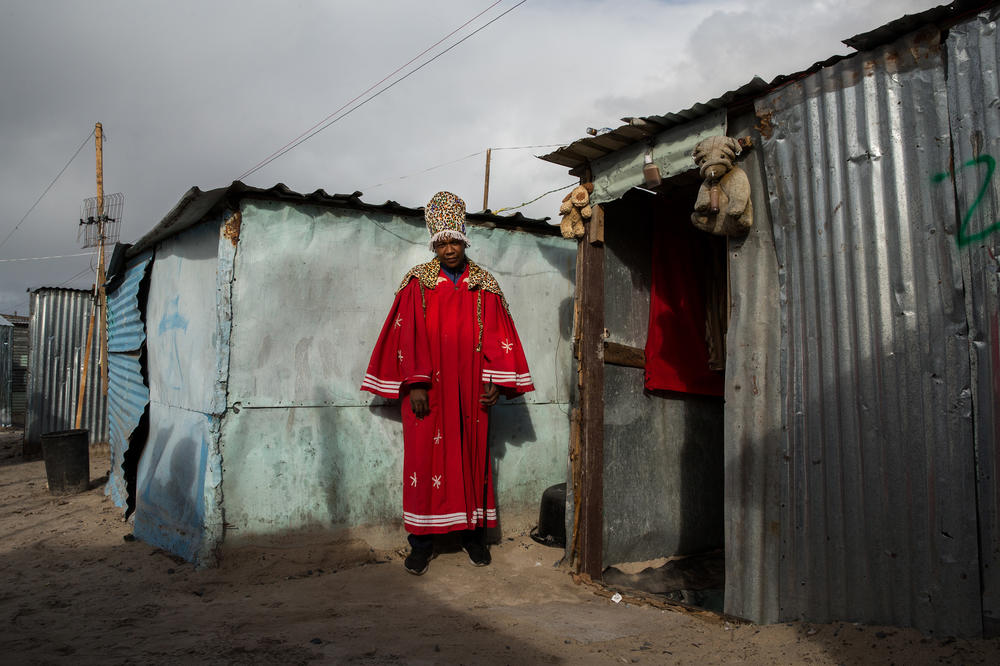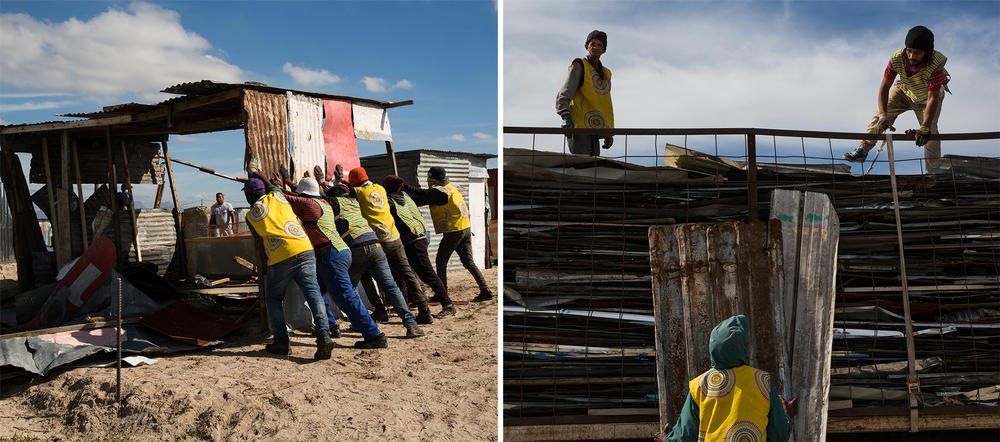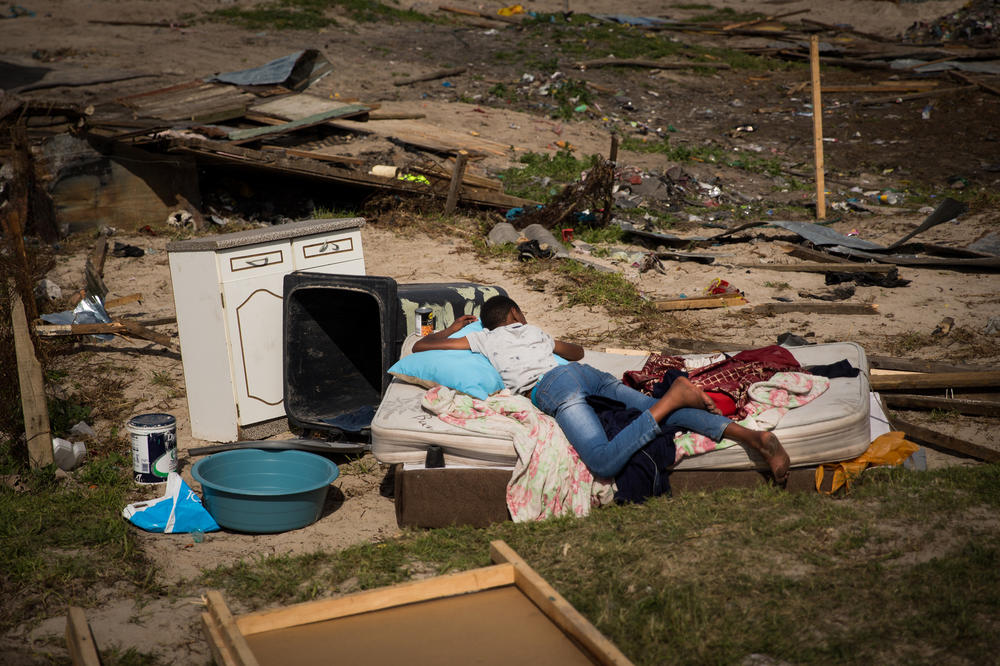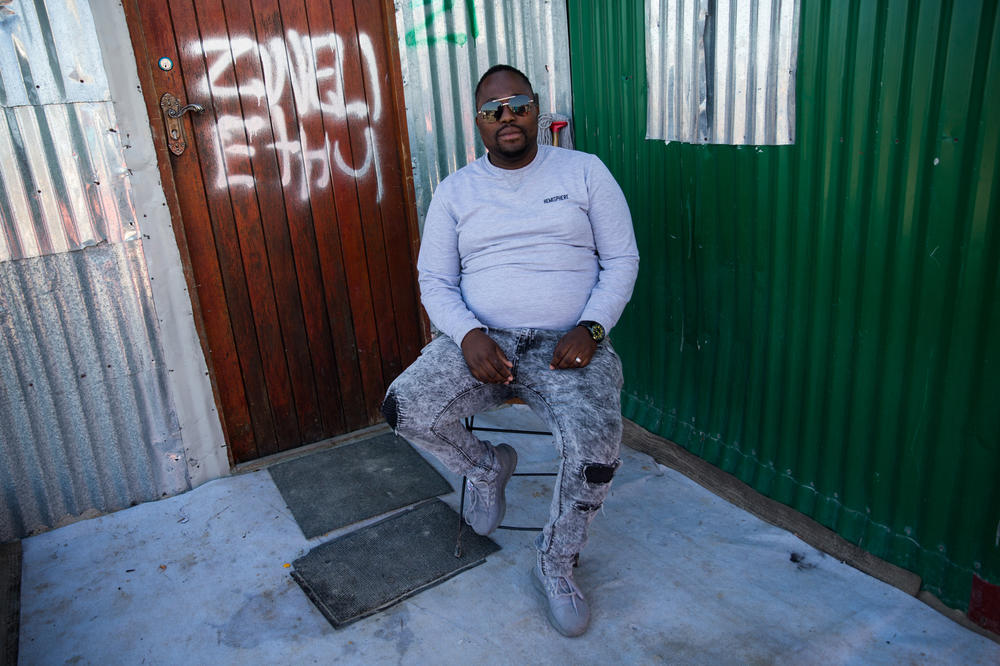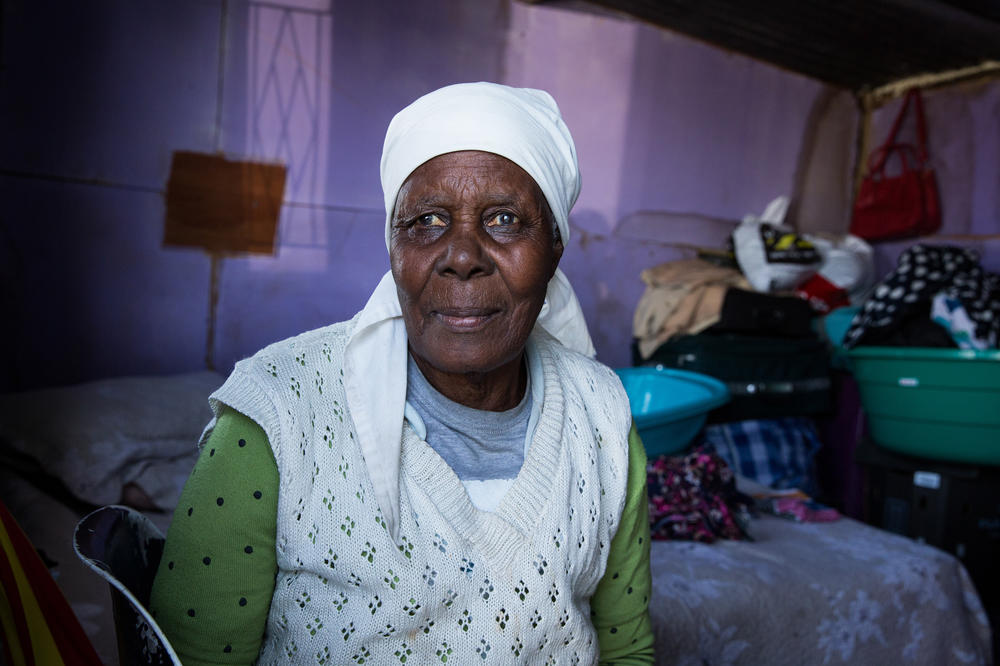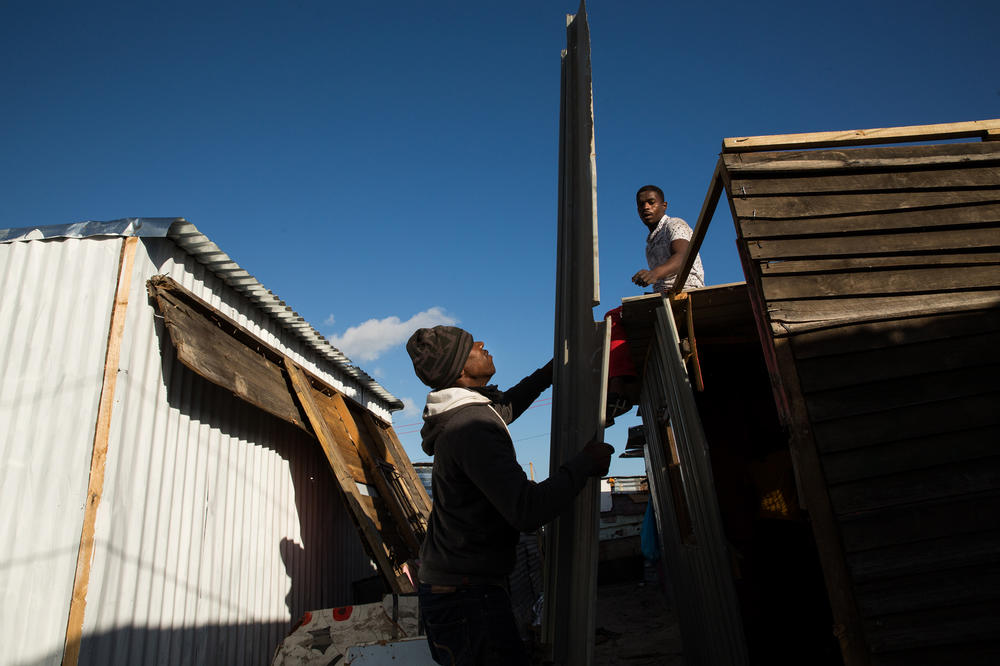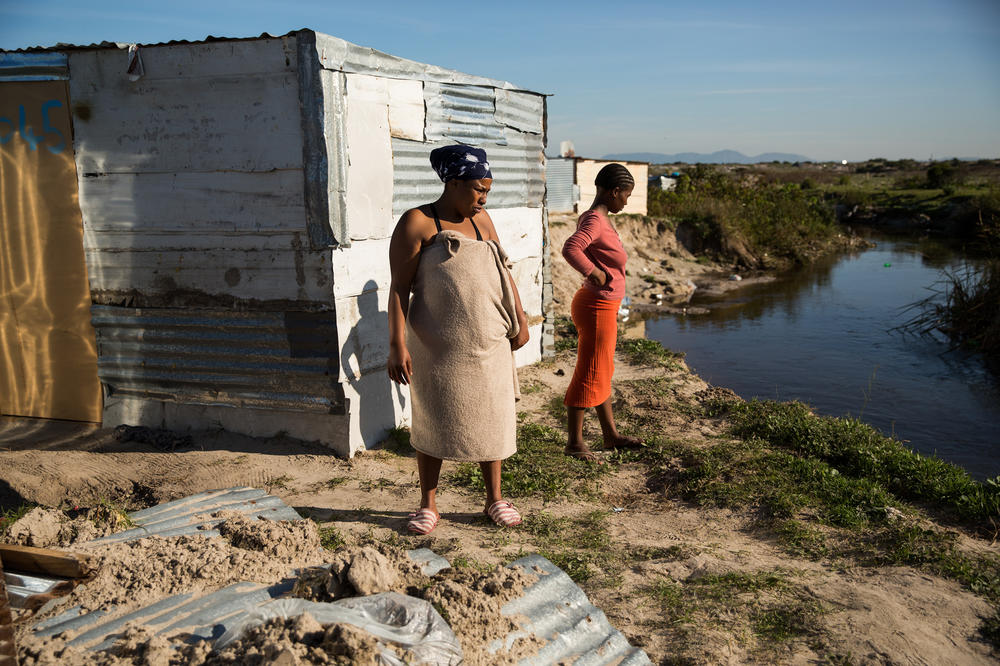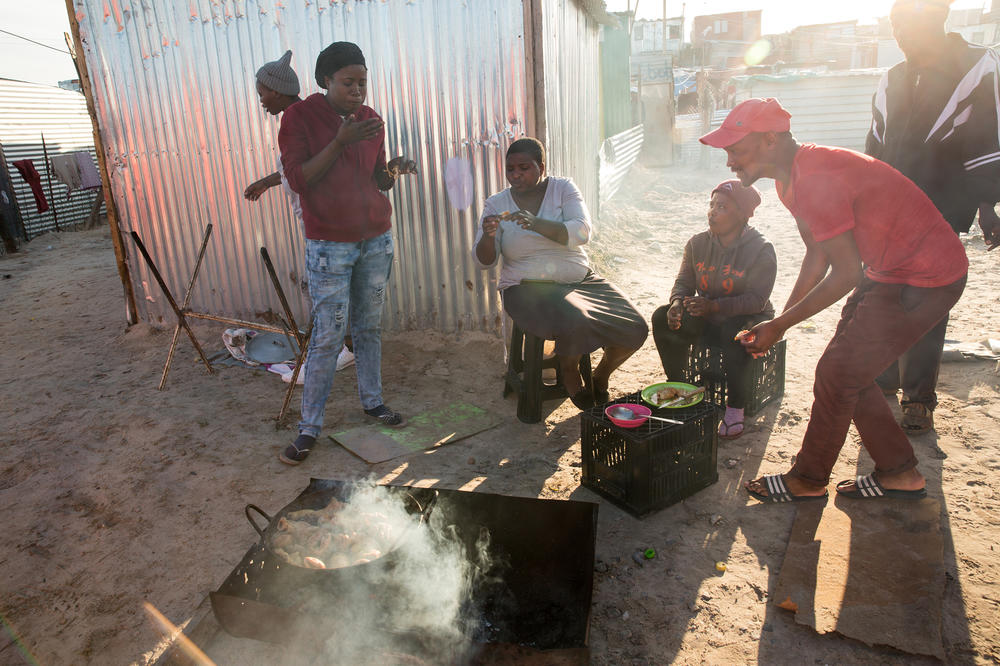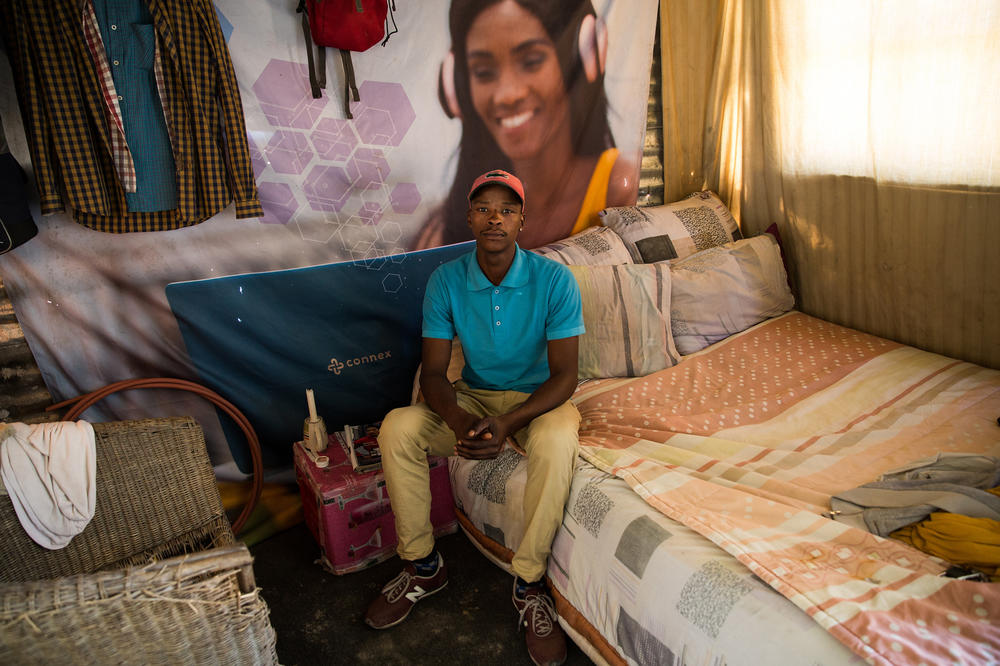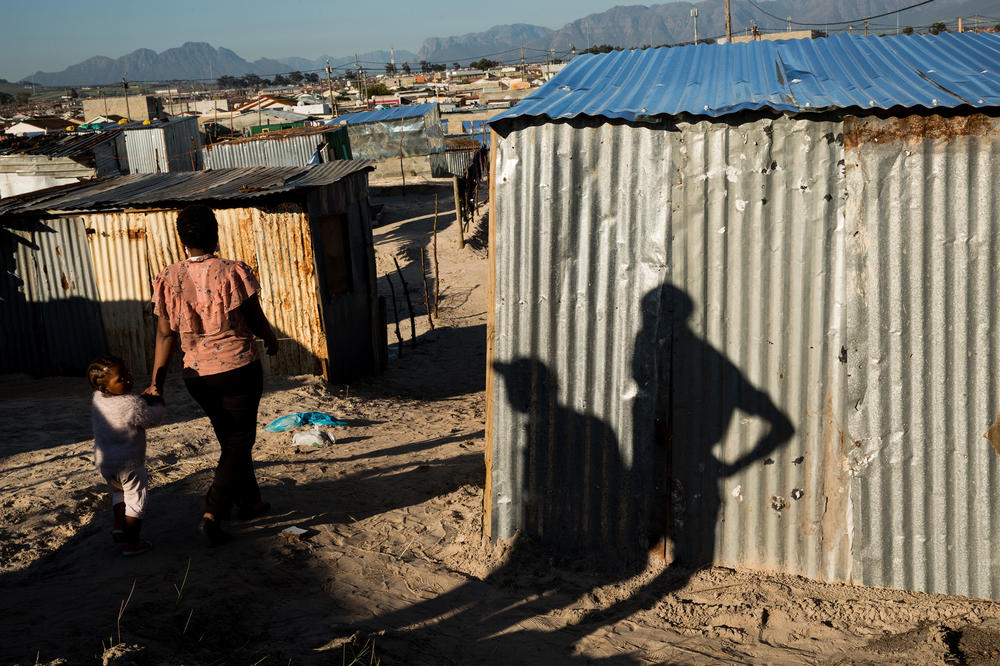Section Branding
Header Content
PHOTOS: Why South Africans Built An Illegal Settlement Called Covid
Primary Content
If you ask Alfred Sonandi where he lives, he'll tell you Izwelethu.
"It sounds nice," he says. "It means 'Our Land' in Xhosa [one of South Africa's 11 languages]. But to be honest, almost everyone here calls it 'Covid.' And 'nice' is not really the word I'd use ..."
Izwelethu, also known as "Covid," is a densely populated settlement in South Africa comprising more than 800 tin shacks and 3,000-plus residents. It was founded in March, when South Africa's national lockdown began, and has been weathering a number of storms ever since — the meteorological ones that the "Cape of Storms" is infamous for, and the grim epidemiological storm of a global pandemic.
The shacks bump up against the township of Mfuleni on one side and the Kuils River on the other. Standing on Covid's sandy hilltop, you can see Table Mountain in the distance.
In the first weeks of June all you could hear in Covid was hammering — the ear-piercing repetition of hammers on sheet metal and nails being driven into wood. You had to raise your voice to be heard.
A month later that sound had faded into the background as the sounds of everyday life took over: kids laughing, a soccer ball being kicked, music pumping from a tavern.
It's a rough metaphor for the COVID-19 pandemic: The panic that gripped South Africa in those early days has fast become the new normal here.
Covid is just one of many new settlements that have sprung up on the outskirts of Cape Town since the lockdown began, on March 27. It's a boom that's continuing today: If you drive along the main highway from the airport to the city on, say, a Tuesday, you'll probably see a handful of new shacks on the side of the road. By the weekend there might be more than 50 — even a hundred.
Shack-building entrepreneurs — especially those who sell the tin sheets that are used as walls and roofs — have been making a killing here. So, too, have the various pop-up industries that support people moving from one place to another — ad hoc moving companies, merchants who sell household goods and food vendors, among others.
Cars are in high demand here. Small vehicles piled high with a family's worldly possessions, moving in and out of the new settlements, are a common sight. And with little to no running water in Covid and other newly erected townships, the vendors who sell big buckets — to people who now have to walk long distances to fetch water — are also thriving.
In a way, some say, this has all happened before. So-called land invasions are old hat in South Africa: The country, after all, is built on a centuries-long legacy of land dispossession.
Most recently Apartheid in many ways created the massive economic divisions in current day South Africa. Those who are too poor have found a place to live by any means necessary.
According to those now in power, and the country's mainstream press, a version of that is what's going on now: Since the coronavirus hit, there's been a staggering rise in "land invasions."
In Cape Town, the reason is obvious: Many of the city's economically vulnerable township citizens lost their jobs and income when the country went into lockdown. Those already living in shacks, often in the backyards of other homes, could no longer afford their rent. So they looked for land where they could erect new shacks and live rent-free. Next to Covid, for example, is a settlement called "Sanitizer." There's also one called "19" (as in COVID-19). It's an example of the sardonic South African sense of humor.
The places that bear these morbidly comic names have caused an uproar in South Africa. Heated arguments about them have been taking place everywhere, from dinner tables and provincial meetings to the highest courtrooms in the country.
Some of the settlements don't last very long. As soon a new one is erected, it may be torn down by teams of the Anti-Land Invasion Unit — the largest law-enforcement operation in the City of Cape Town, whose members wear riot gear and wield shotguns — plus contract workers and city employees.
When these homes are destroyed, possessions are trampled on or thrown in the dirt. The metal sheets used as walls and roofs are confiscated and loaded onto large trucks. If an angry crowd forms, authorities use rubber bullets to disperse it.
The township communities' outrage over the destruction of these nearby settlements boiled over into violence in the middle of the winter, when, on July 1, a video — so disturbing that local news stations preceded it with a warning — went viral. At a time when the government was telling citizens to stay in their homes, a naked man named Bulelani Qolani was seen being dragged from his makeshift house as it was razed by the Anti-Land Invasion Unit.
The unit has been extremely busy since this graphic incident took place. According to Cape Town Mayor Dan Plato, it has removed more than 55,000 structures in about 30 parts of the metro area. "There have been well over 100 separate land-invasion incidents recorded," he says.
But those who live in Cape Town's new settlements say they're not "invading" anyone.
"[The language that officials use makes] it sound like a war," says Thembile Gatyeni, one of several community-appointed leaders in Covid. "They use these words [like]'invasion,' 'siege,' 'land-grabbing.' But we're not here to fight or cause trouble for the city. We just need a piece of land to live [on]. A place to call our own. A place where we don't have to pay rent. We're not an invading army."
The people who live on the sandy stretches that comprise Covid are here out of desperation, not choice. While they may have a piece of tin over their heads at night (at least for now), their community has no electricity or sanitation services. Only a few taps have running water.
Plato says the spaces these people are "invading" are actually "public land earmarked for housing, health care, schools, transport and basic services." If they would only get off it, he promises, the city would build them a better community.
Covid residents say that history has given them little reason to believe him. Every election cycle, the government promises housing and services for all. But these promises, residents say, are never kept.
"And next year won't be any different," says Covid resident Noxolo Nondala. "[Politicians will] come for their [votes] and promise us houses, but the houses just never come. We've been waiting since 1994"—the year that Nelson Mandela came to power, South African democracy was born, and "things were supposed to change."
In late August, the Cape Town High Court issued an interim interdict barring city officials from evicting illegal land occupiers from their shacks without first obtaining a court order. The interdict is slated to remain in place for the duration of the national lockdown, which now has been extended through mid-December. The city has appealed the ruling.
The news from the court in August failed to lighten the mood in Covid. When the interdict came down, rain did too, in droves — days and days of rain that flooded hundreds of shacks. Many residents were forced to flee in the middle of the night as their shacks filled with water, leaving them sleepless and homeless, helpless and exhausted.
Yet the residents of Covid, and other new settlements like it, did what they've always done before: They dried themselves and their belongings off and started another day.
Days have since stretched into weeks. Summer and the Cape's infamous seasonal winds have brought new challenges for those whose homes are made of tin.
Covid resident Linda Maseko, whose shack has not been blown over (so far), counts herself among the lucky ones. In fact, she says, the six-month anniversary of her life in Covid passed by relatively uneventfully. "A good thing," she says. "No cops or dramas, for now. But it'll come ... down the road."
In the meantime, an air of permanence has started to settle over Covid's dusty streets. "People are realizing that, like it or not, we're here to stay," says Maseko.
More and more informal shops run out of people's homes are opening, including Maseko's (she sells small decanted bottles of paraffin, which is used for home cooking or lighting). People have put up photographs on the walls of their shacks and enrolled their children in nearby schools for the coming school year.
As with the pandemic itself, no one knows what will happen next — next week, next month, next year. Along with that strange feeling of permanence, Sonandi says, "remains a feeling of unease."
Some think that when South Africa's National State of Disaster ends and the court's interdict falls away, evictions are likely to resume, and conflict between residents and the Anti-Land Invasion Unit will begin again.
"But we're trying to just think of today," Sonandi says. "Today, we're still just asking the city for sanitation. We're desperate for toilets. We're desperate for dignity."
Samantha Reinders is a photojournalist based in South Africa. She divides her time between Cape Town and a farm in her beloved Karoo desert with Angora goats, four rabbits and a grumpy turkey. You can see more of her work on www.samreinders.com and @samreinders on Instagram.
Copyright 2020 NPR. To see more, visit https://www.npr.org.
